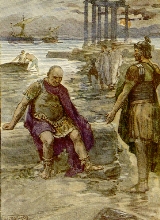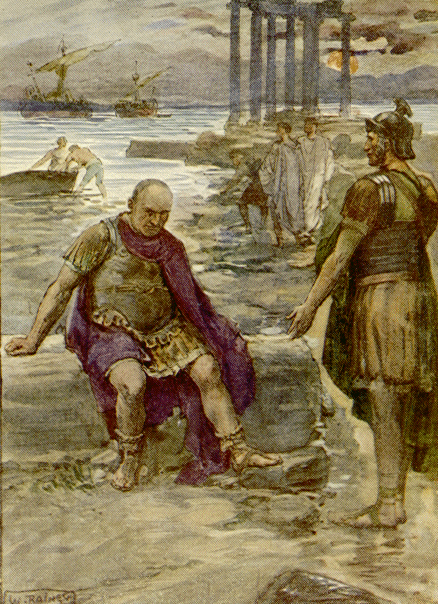
Publius Sextilius
Encyclopedia
Publius Sextilius was a Roman praetor
(92 BC?) and governor
of Africa during the civil wars between Sulla and Marius
. As propraetor in 88 B.C., he refused Marius
and his followers asylum in Africa.
presents a highly colored version of how Sextilius rejected Marius and furnishes a moral:
 Little is known of this Sextilius. It is likely that he belonged to the senatorial
Little is known of this Sextilius. It is likely that he belonged to the senatorial
family of Sextilii
who used the praenomen
Publius, among them a 2nd-century B.C. praetor from whom a letter fragment survives. At one time, numismatic evidence was interpreted as referring to Sextilius as praetor and propraetor, but the coin has since been determined to belong to the Augustan
period.
Before the arrival of Marius in Africa, Sextilius had taken a neutral position in the civil war. He had allowed some of Marius's allies to join up with Hiempsal II
, king of Numidia
, who at that time was attempting to gain the confidence of the Marians while acting on behalf of Sulla. If Sextilius had been serious about carrying out his threat to treat Marius as a public enemy — a senatorial decree which sanctioned his execution at sight — he most likely would have allowed Marius to enter the country rather than warning him off. The difficulty of Sextilius's position is indicated by the consequences of his action: since no further public office for him is known, he evidently pleased neither side in the conflict.
in depriving a young woman of her inheritance. E. Badian has argued that this was the P. Sextilius who became governor of Africa and dates his praetorship to 92.
of literature. When Cassius Dionysius
of Utica
translated the great agricultural treatise of Mago the Carthaginian
into Greek
, he dedicated his translation to Sextilius.
Praetor
Praetor was a title granted by the government of Ancient Rome to men acting in one of two official capacities: the commander of an army, usually in the field, or the named commander before mustering the army; and an elected magistratus assigned varied duties...
(92 BC?) and governor
Roman governor
A Roman governor was an official either elected or appointed to be the chief administrator of Roman law throughout one or more of the many provinces constituting the Roman Empire...
of Africa during the civil wars between Sulla and Marius
Sulla's first civil war
Sulla's first civil war was one of a series of civil wars in ancient Rome, between Gaius Marius and Sulla, between 88 and 87 BC.- Prelude - Social War :...
. As propraetor in 88 B.C., he refused Marius
Gaius Marius
Gaius Marius was a Roman general and statesman. He was elected consul an unprecedented seven times during his career. He was also noted for his dramatic reforms of Roman armies, authorizing recruitment of landless citizens, eliminating the manipular military formations, and reorganizing the...
and his followers asylum in Africa.
Marius in Africa
PlutarchPlutarch
Plutarch then named, on his becoming a Roman citizen, Lucius Mestrius Plutarchus , c. 46 – 120 AD, was a Greek historian, biographer, essayist, and Middle Platonist known primarily for his Parallel Lives and Moralia...
presents a highly colored version of how Sextilius rejected Marius and furnishes a moral:

Roman Senate
The Senate of the Roman Republic was a political institution in the ancient Roman Republic, however, it was not an elected body, but one whose members were appointed by the consuls, and later by the censors. After a magistrate served his term in office, it usually was followed with automatic...
family of Sextilii
Sextilia (gens)
The gens Sextilia was a plebeian family at Rome. The first member of the gens to achieve prominence was Gaius Sextilius, consular tribune in 379 BC...
who used the praenomen
Praenomen
The praenomen was a personal name chosen by the parents of a Roman child. It was first bestowed on the dies lustricus , the eighth day after the birth of a girl, or the ninth day after the birth of a boy...
Publius, among them a 2nd-century B.C. praetor from whom a letter fragment survives. At one time, numismatic evidence was interpreted as referring to Sextilius as praetor and propraetor, but the coin has since been determined to belong to the Augustan
Augustus
Augustus ;23 September 63 BC – 19 August AD 14) is considered the first emperor of the Roman Empire, which he ruled alone from 27 BC until his death in 14 AD.The dates of his rule are contemporary dates; Augustus lived under two calendars, the Roman Republican until 45 BC, and the Julian...
period.
Before the arrival of Marius in Africa, Sextilius had taken a neutral position in the civil war. He had allowed some of Marius's allies to join up with Hiempsal II
Hiempsal II
Hiempsal II was a king of Numidia. He was the son of Gauda, half-brother of Jugurtha, and was the father of Juba I.In 88 BC, after the triumph of Lucius Cornelius Sulla, when Gaius Marius and his son fled from Rome to Africa, Hiempsal received them with apparent friendliness, his real intention...
, king of Numidia
Numidia
Numidia was an ancient Berber kingdom in part of present-day Eastern Algeria and Western Tunisia in North Africa. It is known today as the Chawi-land, the land of the Chawi people , the direct descendants of the historical Numidians or the Massyles The kingdom began as a sovereign state and later...
, who at that time was attempting to gain the confidence of the Marians while acting on behalf of Sulla. If Sextilius had been serious about carrying out his threat to treat Marius as a public enemy — a senatorial decree which sanctioned his execution at sight — he most likely would have allowed Marius to enter the country rather than warning him off. The difficulty of Sextilius's position is indicated by the consequences of his action: since no further public office for him is known, he evidently pleased neither side in the conflict.
Date of praetorship
Cicero writes of a P. Sextilius Rufus who claimed he was bound by his oath of office to follow the Lex VoconiaLex Voconia
Lex Voconia was a law established in ancient Rome in 169 BC.Introduced by Q. Voconius Saxa with support from Cato the Elder, Voconius being tribune of the people in that year, this law prohibited those who owned property valued at 100,000 asses from making a woman their heir...
in depriving a young woman of her inheritance. E. Badian has argued that this was the P. Sextilius who became governor of Africa and dates his praetorship to 92.
Literary interests
There is some indication that Publius Sextilius took an interest in or was a patronPatronage
Patronage is the support, encouragement, privilege, or financial aid that an organization or individual bestows to another. In the history of art, arts patronage refers to the support that kings or popes have provided to musicians, painters, and sculptors...
of literature. When Cassius Dionysius
Cassius Dionysius
Cassius Dionysius of Utica was an ancient Greek agricultural writer of the 2nd century BC. The Roman nomen, Cassius, combined with the Greek cognomen, Dionysius, make it likely that he was a slave , originally Greek-speaking, who was owned and afterwards freed by a Roman of the gens Cassia...
of Utica
Utica, Tunisia
Utica is an ancient city northwest of Carthage near the outflow of the Medjerda River into the Mediterranean Sea, traditionally considered to be the first colony founded by the Phoenicians in North Africa...
translated the great agricultural treatise of Mago the Carthaginian
Mago (agricultural writer)
Mago was a Carthaginian writer, author of an agricultural manual in Punic which was a record of the farming knowledge of Carthage. The Punic text has been lost, but some fragments of Greek and Latin translations survive....
into Greek
Ancient Greek
Ancient Greek is the stage of the Greek language in the periods spanning the times c. 9th–6th centuries BC, , c. 5th–4th centuries BC , and the c. 3rd century BC – 6th century AD of ancient Greece and the ancient world; being predated in the 2nd millennium BC by Mycenaean Greek...
, he dedicated his translation to Sextilius.

